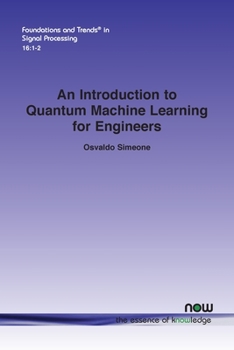An Introduction to Quantum Machine Learning for Engineers
This monograph is motivated by a number of recent developments that appear to define a possible new role for researchers with an engineering profile. First, there are now several software libraries - such as IBM's Qiskit, Google's Cirq, and Xanadu's PennyLane - that make programming quantum algorithms more accessible, while also providing cloud-based access to actual quantum computers. Second, a new framework is emerging for programming quantum algorithms to be run on current quantum hardware: quantum machine learning. In the current noisy intermediate-scale quantum (NISQ) era, quantum machine learning is emerging as a dominant paradigm to program gate-based quantum computers. In quantum machine learning, the gates of a quantum circuit are parametrized, and the parameters are tuned via classical optimization based on data and on measurements of the outputs of the circuit. Parametrized quantum circuits (PQCs) can efficiently address combinatorial optimization problems, implement probabilistic generative models, and carry out inference (classification and regression). This monograph provides a self-contained introduction to quantum machine learning for an audience of engineers with a background in probability and linear algebra. It first describes the background, concepts, and tools necessary to describe quantum operations and measurements. Then, it covers parametrized quantum circuits, the variational quantum eigensolver, as well as unsupervised and supervised quantum machine learning formulations.
Format:Paperback
Language:English
ISBN:1638280584
ISBN13:9781638280583
Release Date:July 2022
Publisher:Now Publishers
Length:238 Pages
Weight:0.75 lbs.
Dimensions:0.5" x 6.1" x 9.2"
Customer Reviews
0 rating





